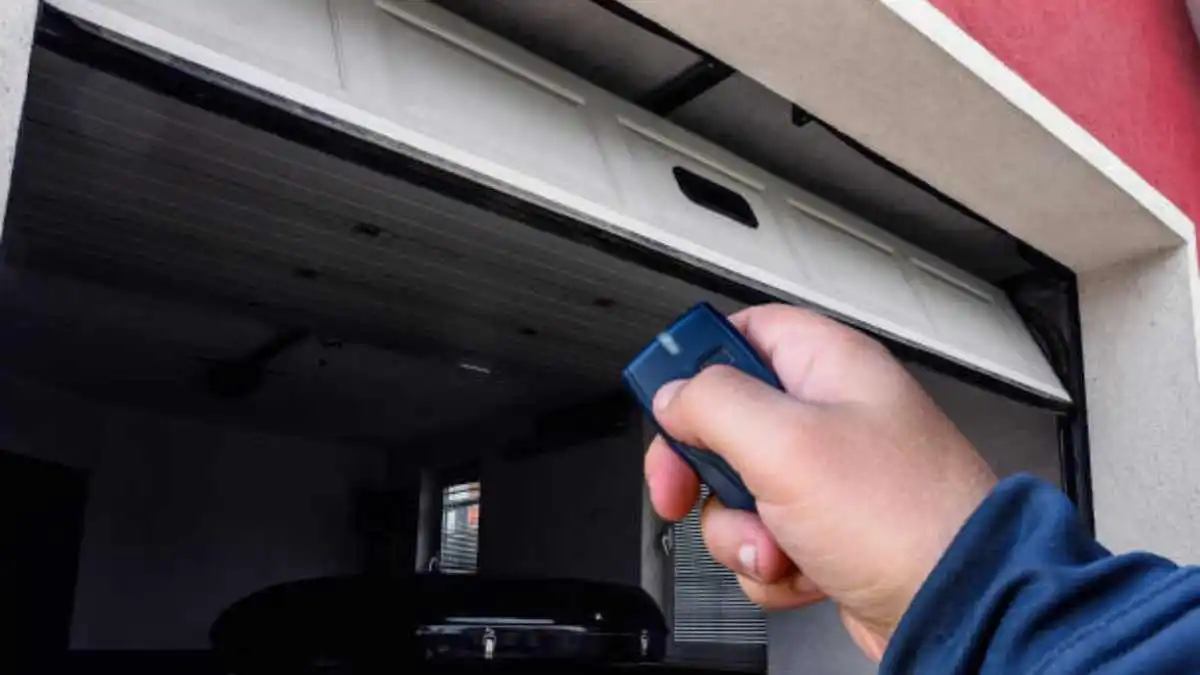HOME IMPROVEMENT
Choosing the Right Garage Door Opener for Your Home: Key Features to Consider

A reliable garage door opener is essential for homeowners who prioritize convenience, safety, and security. With a wide variety of garage door opener options available, each with unique features, selecting the right one can feel overwhelming. Understanding the key aspects to consider when choosing a garage door opener can help you make an informed decision that meets your needs and enhances your home’s functionality.
In this article, we’ll cover the most important features to consider when choosing a garage door opener to ensure you find the perfect fit for your home.
Table of Contents
1. Types of Garage Door Openers: Which Is Right for You?
The first step in choosing the right garage door opener is understanding the different types available. Garage door openers are classified by their drive systems, each with its own advantages depending on your specific needs, budget, and noise preferences.
Common Types of Garage Door Openers:
- Chain-Drive Openers: These are among the most common and cost-effective options. Chain-drive openers use a metal chain to lift and lower the door. While they are durable and relatively affordable, chain-drive openers can be noisy, making them less ideal for attached garages or homes with nearby bedrooms.
- Belt-Drive Openers: Belt-drive systems use a rubber belt instead of a chain, resulting in a quieter operation. This type of opener is perfect for homes where noise is a concern. Although typically more expensive than chain-drive models, belt-drive openers offer smooth, reliable performance and are known for their durability.
- Screw-Drive Openers: Screw-drive openers use a threaded steel rod to move the door. They require less maintenance than chain or belt systems and are fairly quiet, though they might produce more noise in extremely cold or hot climates due to temperature fluctuations affecting the metal.
- Direct-Drive Openers: In direct-drive models, the motor itself moves the door along the track. These openers are very quiet and have fewer moving parts, which minimizes the need for maintenance and reduces noise levels.
Understanding the strengths and weaknesses of each drive system helps you choose the one that best suits your home’s layout, noise tolerance, and budget.
2. Consider the Horsepower Needed for Your Door
Horsepower (HP) is an important factor in determining the strength of a garage door opener. The horsepower required will depend on the weight and size of your garage door, as well as the frequency of use. Choosing an opener with the appropriate horsepower ensures smooth and efficient operation without overworking the motor.
Common Horsepower Options:
- 1/3 HP: Suitable for lighter, single-car garage doors. This level of horsepower is often used for standard, lightweight doors.
- 1/2 HP: This is the most common option and works well for most residential doors, including standard single- and double-car garage doors.
- 3/4 HP: Ideal for heavier doors, such as insulated, wooden, or oversized doors, where extra lifting power is needed. A 3/4 HP opener is also beneficial for homes with frequent garage door use.
Choosing the right horsepower ensures the opener operates efficiently, reducing strain on the motor and extending the lifespan of the system.
3. Look for Safety and Security Features
Modern garage door openers come equipped with a variety of safety and security features that help protect your family and home. When selecting an opener, it’s essential to prioritize features that enhance safety and prevent unauthorized access.
Key Safety and Security Features:
- Rolling Code Technology: This feature changes the access code each time the remote is used, preventing hackers from capturing and duplicating the code to gain entry.
- Auto-Reverse Mechanism: Most garage door openers have an auto-reverse feature that automatically stops and reverses the door if it detects an obstacle in its path. This is crucial for preventing injuries and protecting pets, children, and vehicles.
- Photo-Eye Sensors: These sensors detect movement or objects in the door’s path, triggering the auto-reverse feature if an obstruction is detected. Regularly test the sensors to ensure they are functioning correctly.
- Manual Release Option: In the event of a power outage, the manual release feature allows you to operate the door manually. This is essential for accessing your garage when the power is out and provides an added layer of security.
Security features are an essential consideration for any garage door opener, as they ensure safe operation and protect your home from unauthorized access.

4. Explore Smart Technology Integration
Smart garage door openers are becoming increasingly popular due to their convenience and connectivity. With a smart opener, you can control and monitor your garage door remotely via smartphone or tablet, making it easier to manage access to your garage no matter where you are.
Benefits of Smart Technology in Garage Door Openers:
- Remote Control: Smart openers allow you to open or close your garage door from anywhere using an app. This feature is especially useful if you need to grant access to family members or service providers when you’re not home.
- Real-Time Alerts: Many smart openers can send notifications to your phone if the garage door is left open or if there is an attempted break-in, adding an extra layer of security.
- Voice Control Compatibility: Some models integrate with voice assistants like Alexa, Google Assistant, or Siri, allowing you to operate your garage door with voice commands.
- Scheduling and Automation: Smart openers allow you to schedule when the door opens or closes, which is useful if you want to set specific times for garage access or ensure the door is closed overnight.
For homeowners looking to embrace smart home technology, a garage door opener with smart integration offers enhanced convenience and control.
5. Noise Level and Vibration Control
Noise level is an important factor, especially for homes with attached garages. Some garage door openers are designed with features that reduce noise and vibration, making them ideal for homes where quiet operation is a priority.
Noise-Reducing Features:
- Soft-Start and Soft-Stop: This feature gradually starts and stops the door movement, reducing sudden noises associated with opening and closing. It also reduces wear on the opener’s motor.
- Vibration Isolation System: Some openers are equipped with vibration isolation mounts that reduce noise and absorb vibrations. This is especially beneficial for attached garages where garage door noise might affect nearby rooms.
- Belt-Drive Systems: For the quietest operation, consider a belt-drive system. These openers are known for smooth, silent performance, making them ideal for homes where noise is a concern.
By choosing a garage door opener with noise control features, you can enjoy the convenience of automatic operation without the disturbances of excessive noise.
6. Battery Backup for Power Outages
In areas prone to power outages, a garage door opener with a battery backup system is invaluable. Battery backup systems ensure that you can still operate your garage door even when the power is out, adding a layer of reliability and security.
Benefits of Battery Backup:
- Continuous Access: During a power outage, a battery backup allows you to open and close the door multiple times, ensuring you’re never stranded outside or trapped inside your garage.
- Emergency Preparedness: Battery backups are particularly useful in severe weather conditions or emergencies, providing you with reliable access to your garage when it’s needed most.
For added peace of mind, investing in a battery backup-equipped garage door opener ensures that your garage door remains functional in any situation.
7. Durability and Maintenance Requirements
The durability of your garage door opener and its ease of maintenance are important considerations for long-term reliability. A well-built, durable opener will not only last longer but also require fewer repairs and adjustments.
Key Durability Features:
- Weather Resistance: If you live in an area with extreme weather conditions, choose an opener designed to withstand temperature fluctuations and humidity.
- Quality Materials: Look for openers made from high-quality components, like stainless steel parts or rust-resistant casings, to ensure longevity.
- Minimal Maintenance: Some openers require regular lubrication or adjustments, while others are low-maintenance by design. Consider the maintenance requirements when choosing an opener to ensure it aligns with your preferences.
Investing in a durable, well-constructed garage door opener minimizes future repair needs, keeping your door functional and reliable for years to come.
Conclusion: Finding the Right Garage Door Opener for Your Needs
Selecting the right garage door opener is essential for enhancing the convenience, safety, and security of your home. By considering factors like drive type, horsepower, safety features, smart technology, noise control, and durability, you can find an opener that meets your needs and fits your lifestyle.
A high-quality garage door opener not only makes daily life easier but also adds value to your home. Working with a knowledgeable provider like Elite Garage Door Repair can help ensure you choose the ideal model for your garage, providing you with years of reliable performance. With the right garage door opener, you can enjoy seamless access to your home and the peace of mind that comes with a secure, efficient system.
-

 GENERAL2 months ago
GENERAL2 months agoUncovering the World of кинокрадко: The Dark Side of Film Piracy
-

 GENERAL1 month ago
GENERAL1 month agoUnveiling the Art of преводсч: How Translators Bridge Language Barriers
-

 GENERAL3 weeks ago
GENERAL3 weeks agoChristofle – For Those Who Dream of Family Heirloom Silver
-

 YOGA1 year ago
YOGA1 year ago4 Person Yoga Poses for Beginners


























